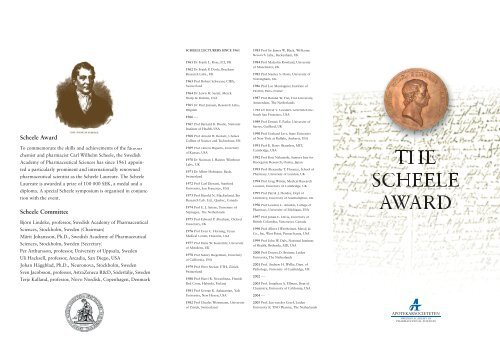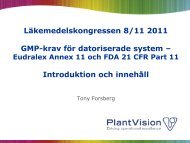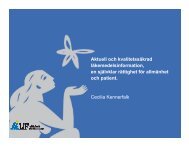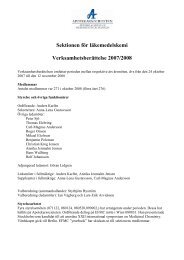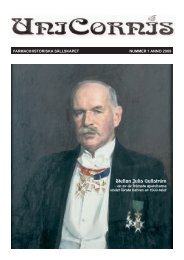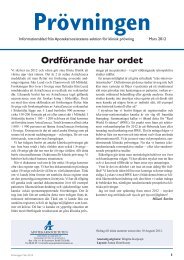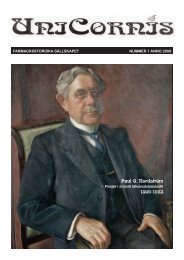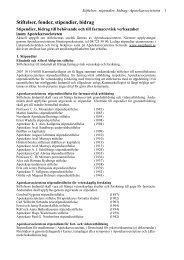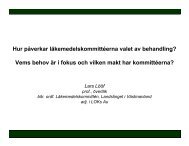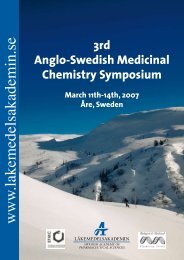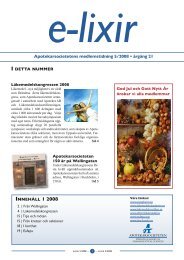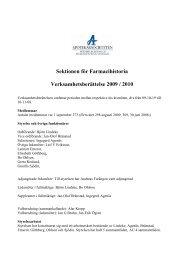Scheele Award Scheele Committee - Apotekarsocieteten
Scheele Award Scheele Committee - Apotekarsocieteten
Scheele Award Scheele Committee - Apotekarsocieteten
You also want an ePaper? Increase the reach of your titles
YUMPU automatically turns print PDFs into web optimized ePapers that Google loves.
SCHEELE LECTURERS SINCE 1961<br />
1983 Prof Sir James W. Black, Wellcome<br />
Research Labs., Beckenham, UK<br />
<strong>Scheele</strong> <strong>Award</strong><br />
To commemorate the skills and achievements of the famous<br />
chemist and pharmacist Carl Wilhelm <strong>Scheele</strong>, the Swedish<br />
Academy of Pharmaceutical Sciences has since 1961 appointed<br />
a particularly prominent and internationally renowned<br />
pharmaceutical scientist as the <strong>Scheele</strong> Laureate. The <strong>Scheele</strong><br />
Laureate is awarded a prize of 100 000 SEK, a medal and a<br />
diploma. A special <strong>Scheele</strong> symposium is organised in conjunction<br />
with the event.<br />
<strong>Scheele</strong> <strong>Committee</strong><br />
Björn Lindeke, professor, Swedish Academy of Pharmaceutical<br />
Sciences, Stockholm, Sweden (Chairman)<br />
Märit Johansson, Ph.D., Swedish Academy of Pharmaceutical<br />
Sciences, Stockholm, Sweden (Secretary)<br />
Per Arthursson, professor, University of Uppsala, Sweden<br />
Uli Hacksell, professor, Arcadia, San Diego, USA<br />
Johan Häggblad, Ph.D., Neuronova, Stockholm, Sweden<br />
Sven Jacobsson, professor, AstraZeneca R&D, Södertälje, Sweden<br />
Terje Kalland, professor, Novo Nordisk, Copenhagen, Denmark<br />
1961 Dr Frank L. Rose, ICI, UK<br />
1962 Dr Frank P. Doyle, Beecham<br />
Research Labs., UK<br />
1963 Prof Robert Schwyzer, CIBA,<br />
Switzerland<br />
1964 Dr Lewis H. Sarett, Merck,<br />
Sharp & Dohme, USA<br />
1965 Dr Paul Janssen, Research Labs.,<br />
Belgium<br />
1966 ----<br />
1967 Prof Bernard B. Brodie, National<br />
Institute of Health, USA<br />
1968 Prof Arnold H. Beckett, Chelsea<br />
College of Science and Technology, UK<br />
1969 Prof Takeru Higuchi, University<br />
of Kansas, USA<br />
1970 Dr Norman J. Harper, Winthrop<br />
Labs., UK<br />
1971 Dr Albert Hofmann, Basle,<br />
Switzerland<br />
1972 Prof Carl Djerassi, Stanford<br />
University, San Francisco, USA<br />
1973 Prof Harold N. MacFarland, Bio<br />
Research Lab. Ltd., Quebec, Canada<br />
1974 Prof E. J. Ariens, University of<br />
Nijmegen, The Netherlands<br />
1975 Prof Edward P. Abraham, Oxford<br />
University, UK<br />
1976 Prof Evan C. Horning, Texas<br />
Medical Center, Houston, USA<br />
1977 Prof Hans W. Kosterlitz, University<br />
of Aberdeen, UK<br />
1978 Prof Sidney Riegelman, University<br />
of California, USA<br />
1979 Prof Peter Speiser, ETH, Zürich,<br />
Switzerland<br />
1980 Prof Harri R. Nevanlinna, Finnish<br />
Red Cross, Helsinki, Finland<br />
1981 Prof George K. Aghajanian, Yale<br />
University, New Haven, USA<br />
1984 Prof Malcolm Rowland, University<br />
of Manchester, UK<br />
1985 Prof Stanley S. Davis, University of<br />
Nottingham, UK<br />
1986 Prof Luc Montagnier, Institute of<br />
Pasteur, Paris, France<br />
1987 Prof Roland W. Frei, Free University,<br />
Amsterdam, The Netherlands<br />
1988 Dr David V. Goeddel, Genentech Inc.,<br />
South San Francisco, USA<br />
1989 Prof Dennis V. Parke, University of<br />
Surrey, Guilford, UK<br />
1990 Prof Gerhard Levy, State University<br />
of New York at Buffalo, Amherst, USA<br />
1991 Prof K. Barry Sharpless, MIT,<br />
Cambridge, USA<br />
1992 Prof Koji Nakanishi, Suntory Inst for<br />
Bioorganic Research, Osaka, Japan<br />
1993 Prof Alexander T. Florence, School of<br />
Pharmacy, University of London, UK<br />
1994 Prof Greg Winter, Medical Research<br />
Council, University of Cambridge, UK<br />
1995 Prof Patrik J. Hendra, Dept of<br />
Chemistry, University of Southampton, UK<br />
1996 Prof Gordon L. Amidon, College of<br />
Pharmacy, University of Michigan, USA<br />
1997 Prof Julian E. Davis, University of<br />
British Columbia, Vancouver, Canada<br />
1998 Prof Albert I Wertheimer, Merck &<br />
Co., Inc, West Point, Pennsylvania, USA<br />
1999 Prof John W. Daly, National Institute<br />
of Health, Bethesda, MD, USA<br />
2000 Prof Douwe.D. Breimer, Leiden<br />
University, The Netherlands<br />
2001 Prof. Andrew H. Wyllie, Dept. of<br />
Pathology, University of Cambridge, UK<br />
2002 ----<br />
2003 Prof. Jonathan A. Ellman, Dept of<br />
Chemistry, University of California, USA<br />
2004 ----<br />
THE<br />
SCHEELE<br />
AWARD<br />
1982 Prof Charles Weissmann, University<br />
of Zürich, Switzerland<br />
2005 Prof. Jan van der Greef, Leiden<br />
University & TNO Pharma, The Netherlands<br />
APOTEKARSOCIETETEN<br />
SWEDISH ACADEMY OF<br />
PHARMACEUTICAL SCIENCES
isolated and characterized several organic acids (lactic-, pyrogallic-,<br />
gallic-, oxalic-, citric-, tartaric-, malic-, mucic- and uric<br />
acid). He invented improved processes for preparing calomel,<br />
phosphorus and ether, and, without realizing it, he touched<br />
upon the principle of photography.<br />
In honour of the world-renowned<br />
Swedish chemist and pharmacist Carl<br />
Wilhelm <strong>Scheele</strong> the Swedish Academy<br />
of Pharmaceutical Sciences has since<br />
the year of 1961 bestowed the <strong>Scheele</strong><br />
<strong>Award</strong> to prominent scientists in<br />
the field of drug research or related<br />
disciplines.<br />
Jan van der Greef<br />
The <strong>Scheele</strong> Pharmacy in Köping, Sweden<br />
The <strong>Scheele</strong> <strong>Award</strong> 2005<br />
The dependence of the development of chemistry on pharmacy<br />
is brilliantly illustrated through the career of Carl Wilhelm<br />
<strong>Scheele</strong>. A native of Strahllsund in northern Germany (in<br />
those days a Swedish province), <strong>Scheele</strong> moved to Sweden at<br />
a young age. In the laboratory of his out-of-the-way town of<br />
Köping, <strong>Scheele</strong> eventually finalized many of the experiments<br />
he had begun during his pharmaceutical apprenticeship and<br />
clerkships in Gothenburg, Malmoe, Stockholm and Uppsala.<br />
The amazing number, quality and variety of experiments<br />
performed by <strong>Scheele</strong> in his short life (1742-1786) clearly<br />
show that his devotion to the laboratory exceeded his devotion<br />
to his pharmacy shop. His discoveries were many and<br />
varied. First of all, <strong>Scheele</strong> should be given proper credit for<br />
the discovery of oxygen in the year 1773. Due to a delay in<br />
the publication of his findings and to the relative isolation in<br />
which <strong>Scheele</strong> lived and worked, the discovery of deflogisticated<br />
air has often been accredited to Joseph Priestly. Apart<br />
from oxygen, <strong>Scheele</strong> discovered seven other elements; barium,<br />
chlorine, fluoride, manganese, molybdenum, nitrogen<br />
and tungsten. <strong>Scheele</strong> discovered and characterized ammonia<br />
and a number of inorganic acids (arsenic, tungstic-, molybdic-,<br />
hydrofluoric- and nitrosulfonic acid). He also discovered,<br />
<strong>Scheele</strong>’s Unanswered Letter<br />
In this letter <strong>Scheele</strong>, the apothecary in Uppsala, thanks the French<br />
scientist Lavoisier for his book and tries to establish a collaboration<br />
for the study of oxygen with the well-equipped Lavoisier. Apparently<br />
Lavoisier never replied, even though <strong>Scheele</strong> had gone to the trouble<br />
to have a friend help him render the letter from German into French.<br />
Some say this is evidence that <strong>Scheele</strong> was the first to discover the<br />
existence of Oxygen.<br />
Equipment developed by <strong>Scheele</strong> for the preparation of oxygen.<br />
The <strong>Scheele</strong> <strong>Award</strong> 2005 has been bestowed upon Professor<br />
Jan van der Greef of the TNO Institute, the Netherlands, for<br />
his visionary contributions in the field of pharmaceutical and<br />
biomedical analysis. His research covers the introduction and<br />
use of advanced techniques such as NMR and mass spectrometry<br />
for quantitative purposes, especially in combination<br />
with the development of multivariate statistical tools. In addition,<br />
Prof. van der Greef recently demonstrated the importance<br />
and role of analytical sciences in systems biology.<br />
Prof. van der Greef is a pioneer in the area of drug quantization<br />
and drug metabolism. Technology developments have<br />
played a vital role in a number of clinical studies conducted<br />
under his leadership. As a result of the pharmaceutical scientific<br />
activities of Prof. van der Greef, several small enterprises<br />
have been formed (Kiadis and BG Medicine). These successful<br />
biotech- and biomedical companies have developed expertise<br />
in specific steps of the drug development process. He has also<br />
been able to balance an active academic leadership as professor<br />
at the University of Leiden, the Netherlands, with his role<br />
as a leader of the TNO institute.<br />
The <strong>Scheele</strong> Symposium, this year with the theme Systems<br />
Biology, will be held at the Biotech Forum in Stockholm on<br />
the 11th of October. It is divided into two parts and includes<br />
many eminent and recognized speakers in the field.


